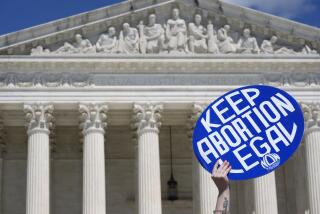Panel Backs Barring State Abortion Curbs
- Share via
WASHINGTON — Acting quickly to strengthen abortion rights after the Supreme Court’s controversial ruling a day earlier on the issue, the House Judiciary Committee Tuesday approved a bill that would forbid any state restrictions on abortions before fetal viability.
A similar bill is expected to be adopted today by the Senate Labor and Human Resources Committee, thus setting the stage for House and Senate consideration of the Freedom of Choice Act later this summer on the eve of the election campaign.
A modified version of the legislation is expected to pass the House and Senate later this year, setting up a confrontation with President Bush, who has signaled that he will veto the bill. Congressional leaders acknowledged that they would not be able to override him.
Supporters said that the legislation, approved by a 20-13 vote, would prevent further erosion of a woman’s right to terminate a pregnancy.
“The Congress has the power, indeed the responsibility, to fill the constitutional void left by the court,” said Rep. Jack Brooks (D-Tex.), chairman of the judiciary panel. Opponents, however, argued that the bill would allow unlimited abortions and undercut reasonable safeguards endorsed by the Supreme Court when it voted by a 5-4 margin Monday to reaffirm the 1973 ruling that first defined abortion as a constitutional right.
“This legislation would impose on all 50 states an unprecedented regimen of abortion on demand,” said Rep. Henry J. Hyde (R-Ill.), a leading spokesman for anti-abortion forces.
In addition to throwing the issue into Congress, Monday’s ruling appeared to ensure that abortion would remain a central issue in the presidential contest this fall. Of the three likely presidential contenders, Bush is the only anti-abortion candidate. Democrat Bill Clinton and independent Ross Perot favor abortion rights.
Meanwhile, Seven leaders of U.S. women’s organizations were arrested in front of the White House on Tuesday for conducting abortion rights demonstrations without a permit. Refusing to disperse, the seven women quietly lined up to be handcuffed while television cameras recorded the scene.
“This is the kick-off of a nonviolent campaign,” said Patricia Ireland, president of the National Organization for Women and one of those arrested. Eleanor Smeal, president of the Feminist Majority Foundation, and Jane Tennington of the Older Women’s League also were taken into custody.
They object to the court’s decision to permit some restrictions on abortion as long as they do not place an “undue burden” on women seeking to end an unwanted pregnancy.
Debate on the Freedom of Choice Act in the House Judiciary Committee reflected the determination of abortion rights advocates to write the Roe vs. Wade ruling into law and prevent states from placing additional restrictions on access to abortions.
Before approving the bill, the House panel adopted an amendment by voice vote that would permit states to pass laws that would “involve” a parent or judge in a minor’s decision on whether to have an abortion.
Supporters of the amendment said that it would allow state “parental consent,” or parental notification laws, if they provided an alternative--such as approval by a judge--that would permit a pregnant teen-ager to get an abortion.
More to Read
Get the L.A. Times Politics newsletter
Deeply reported insights into legislation, politics and policy from Sacramento, Washington and beyond. In your inbox twice per week.
You may occasionally receive promotional content from the Los Angeles Times.










